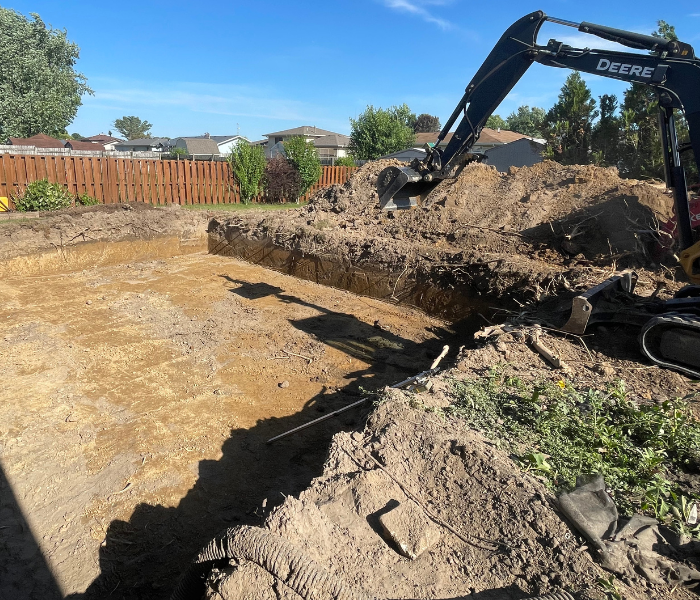Lancaster Trenching - Specialist Trenching Solutions in Lancaster, Ohio
Lancaster Trenching - Specialist Trenching Solutions in Lancaster, Ohio
Blog Article
Comprehensive Excavation Strategies: Grasping the Basics for Success
In the realm of construction and civil design, the importance of effective excavation approaches can not be overemphasized. The careful planning, specific execution, and careful interest to information called for in excavation projects require a detailed technique that encompasses different basic facets. From first dirt analysis to the implementation of precaution and normal progression tracking, understanding these core aspects is necessary for attaining success in any type of excavation venture. Nonetheless, the real mastery exists not just in understanding these fundamentals yet in perfectly integrating them to navigate the intricacies of excavation tasks with skill.
Comprehending Excavation Project Preparation

Effective excavation jobs are improved the foundation of detailed and meticulous planning. The preliminary phase of any type of excavation task is the preparation stage, where critical choices are made that can considerably impact the result of the job. During this stage, it is essential to gather all relevant info about the website, consisting of topographical surveys, dirt structure, and any potential dangers that may exist. Recognizing the project budget, timeline, and range restrictions is crucial for producing an extensive excavation strategy that guarantees the project's success.
One trick aspect of excavation project planning is the development of a thorough timeline that details the series of target dates, milestones, and tasks. By very carefully thinking about all these variables throughout the preparation phase, excavation tasks can be carried out successfully and efficiently, leading to effective outcomes - dump truck companies in ohio.
Soil Evaluation and Site Evaluation
Conducting thorough dirt evaluation and site assessment is a critical action in the preparation phase of any kind of excavation task. Dirt evaluation entails figuring out the composition, framework, and properties of the dirt at the excavation website. This details is important for recognizing the dirt's bearing capability, wetness content, and potential for disintegration, which are vital consider figuring out the excavation approaches and equipment needed for the task.
Site evaluation goes beyond soil evaluation and includes a wider evaluation of the total site problems. This examination consists of identifying any kind of prospective threats, such as below ground energies, environmental issues, or unsteady surface, that might impact the excavation procedure. By extensively evaluating the site, job supervisors can establish reliable excavation techniques that prioritize safety and security, efficiency, and environmental management.
Using innovative innovations like ground-penetrating radar, dirt sampling, and drone surveys can boost the precision and performance of soil analysis and site examination. Spending time and resources in these initial actions can inevitably conserve time and protect against pricey hold-ups or complications during the excavation process.
Devices Choice and Use
Reliable excavation projects depend click over here heavily on calculated equipment choice and usage to make certain ideal efficiency and performance. Choosing the right tools for the job is vital in taking full advantage of effectiveness and minimizing downtime. Elements such as the kind of dirt, deepness of excavation, and job scope play a substantial duty in establishing the most appropriate devices for the task available.

Along with picking the suitable equipment, appropriate utilization is key to job success. Operators has to be trained to take care of the equipment safely and effectively - excavating ohio. Normal maintenance checks and timely fixings assist protect against malfunctions and make sure consistent efficiency throughout the project
Security Procedures and Laws Compliance
In the realm of excavation projects, focusing on precaution and conformity with laws is paramount to making certain a safe and legally audio functional atmosphere. Precaution include a variety of methods, consisting of conducting detailed website analyses, implementing correct signage and barriers, and offering ample safety and security training for all personnel involved in the excavation process. Adherence to regulations, such as OSHA requirements in the USA, ensures that the excavation project browse around here fulfills the required standards to shield employees, spectators, and the surrounding environment.

Monitoring Development and Adjusting Approaches
Exactly how can project supervisors successfully track the innovation of excavation projects and adjust their approaches appropriately to enhance end results? Surveillance development is crucial for guaranteeing that excavation jobs remain on track and satisfy target dates. Job managers can use different devices and methods to track progression, such as everyday progression reports, normal website evaluations, and progressed surveillance modern technologies like drones and GPS tracking systems. By constantly checking the project's advancement, managers can identify any potential delays or issues early and take proactive steps to resolve them.

Final Thought
In final thought, mastering the fundamentals of detailed excavation approaches is necessary for the success of any kind of task. By comprehending project planning, evaluating soil and site problems, selecting ideal devices, conforming with security regulations, and monitoring progression, task managers can ensure a effective and smooth excavation process. Applying these strategies will result in successful end results and minimize potential risks or troubles throughout the excavation task.
The preliminary stage of any type of excavation job is the preparation stage, where crucial decisions are made that can significantly affect the outcome of the task. Understanding the task extent, timeline, and budget plan restrictions is crucial for developing an extensive excavation strategy that guarantees the job's success.
How can predict supervisors properly track the improvement of excavation projects and adapt their strategies accordingly to enhance outcomes? By closely checking progression and being eager to adjust strategies, project supervisors can enhance the total success of excavation projects.
By recognizing project preparation, assessing soil and site problems, picking appropriate devices, complying with safety check and security laws, and checking progress, task managers can guarantee a smooth and effective excavation procedure.
Report this page